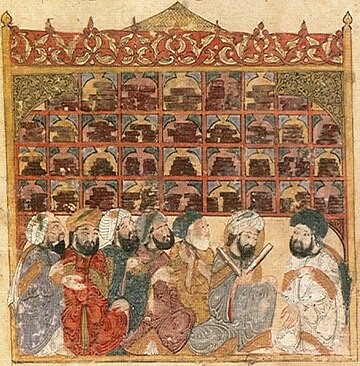Ho sabíeu?
Podeu fer doble clic en una paraula per a buscar-la a TermGallery.
Podeu fer doble clic en una paraula per a buscar-la a TermGallery.
Significats de ʿulamâ en anglès

Muslim legal scholars.
Termes relacionats
Ús de ʿulamâ en anglès
1
His father was one of the viziers, not one of the 'ulamá.
2
Even the Persian government itself became awakened and regretted that which had arisen through the fault of the 'ulamá.
3
Some there are in Persia who have become liberated through this cause, whose cleverness and eloquence the 'ulamá cannot refute.
4
Likewise, the foundation of the religion of Muḥammad has disappeared, but its form remains in the hands of the official 'ulamá.
5
For example, two men will go to law, and one of the 'ulamá will find for the plaintiff and another for the defendant.
6
Many 'ulamá and public men, as well as other people, joyfully sacrificed their lives in His Cause, and hastened to the plain of martyrdom.
7
Then he appointed the 'ulamás of 'Iráq to intercede for him.
8
He was molested and harassed; the inhabitants rioted, and the evil 'ulamás plotted his death.
9
By some of the 'Ulamá they are considered to be equal to the Mujtahidín of the third class.
10
'Ulamá, from the Arabic 'alima, to know, may be translated learned men, scientists, religious authorities.
11
One day the government leaders, pillars of the country, the city's 'ulamás, leading mystics and intellectuals came out to the Mansion.
12
This was soon known throughout the city; to the eyes of the evil 'ulamás, he was now an object of hate and contempt.

